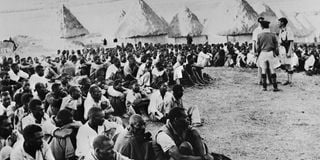Learn selfless service from Mau Mau

Hundreds of arrested Kenyans wait to be questioned after the massacre of 200 loyalist Kikuyus in a Mau Mau camp, in March 1953, near Nairobi.
Two months after Independence in 1963, Field Musa Marshal Mwariama, supreme commander of the Mau Mau on the eastern side of Mt Kenya, was arrested and charged with “obstruction” and “disorderly behaviour” at his camp, where he and 2,000 demobilised fighters were transitioning from bush war to civilian life.
Attorney-General Charles Njonjo had given consent to prosecute and the magistrate sentenced the fighter to five years in jail. To his credit, Prime Minister Jomo Kenyatta intervened to have him released. Field Marshal Mwariama was allocated 15 acres of land in Timau, Meru, and in a moment of crisis after the assassination of Tom Mboya in 1969, Mzee Kenyatta had him appointed assistant chief.
I heard that, after doing that very important job for some time, he neatly folded his uniform and returned it to the district commissioner and went back to being a peasant on his 15 acres.
In Timau, farms run to 10,000 or 12,000 acres. From what I read in a Facebook post quoting David Njagi’s The Last Mau Mau, two comrades from the struggle visited his camp from Nairobi and he invited them to greet the assembled fighters, against the orders of the police in the camp. He would not allow his visitors to be deprived of the right to speak.
Two years after the Mwariama drama, Inspector Anthony Ochindo shot and killed General Baimungi Marete at the general’s encampment. I’m not sure what the allegation was but the general was obviously slow to integrate back to civilian life.
His treasury was looted and his herd of cattle sold for a song. His widow died in 2014 still fighting for the 12,000 acres of land in a settlement scheme that she maintained Mzee Kenyatta gave to her husband.
Only a small elite is celebrating the 60 years of self-rule that we marked yesterday. Does any of this stuff matter any more? Probably not. We are the last of the generation that has any connection with the war of liberation, but just because some of our parents fought in it.
Don't give a hoot
Most Kenyans don’t give a hoot, do not recognise the sacrifice of those who fought, do not know and don’t care why they fought. They just want to carry on with their difficult lives.
I think the trauma of that war—and it is, in my view, massive community trauma across the Mt Kenya region—will die off with successive generations. Our job is, probably, to just document the truth and leave it there in the unlikely event that somebody in future would be interested in it.
However, we should, perhaps, be aware that our lost potential and the difficult lives we lead are consequences of the fact that Kenya is not yet an independent state, it is not a post-colonial state, it is still a colonial state, albeit a more modern form of colonialism. And this has nothing to do with the British or imperialism. From a qualitative perspective, Kenya is worse off today than it was in 1963. At least in 1963, there was widespread optimism that things would be better.
We are a society driven by the same instincts of astounding selfish greed, accumulative and mindless corruption and extractive myopia.
We are like cows, just chomping on the grass without an awareness of what time of the day it is, where the grass comes from and where we will find food tomorrow. The DNA of Kenyan politics remains deceit, a promise-and-forget system in a country which probably hasn’t had more than one or two honest elections in its six decades of existence.
In many respects, the government remains an instrument of oppression and dispossession. It limits the expression of popular will and facilitates the unfair and undeserved transfer of resources from the many to the few.
Ingrained in the national character is ingratitude and contempt for sacrifice. A man who does not steal public wealth is regarded as a fool. Between 12,000 and as many as 20,000 Mau Mau were killed in combat. Some 70,000 were incarcerated in concentration camps. Who cares? Soldiers are dying in combat in Somalia, and intelligence and police officers die in the line of duty all the time. Who cares?
The organising force of our society remains tribalism. That is why appointment after appointment can shamelessly be from the same tribe. Given that only two tribes have dominated power for 60 years, the other 40 are still waiting for Godot. But even in parts of the private sector, tribalism plays a bigger role in some decisions than is acknowledged.
But all is not lost. We can, and should, learn from the Mau Mau. We should seek leadership to serve the people, not our greed. Our politics should be based on honour and respect for the public, not deceit. We should aspire to democracy, not the dictatorship of wapende wasipende. We should recognise, reward and cultivate an abiding commitment to personal sacrifice for the common good. We should love and venerate the Republic, not your bloody tribe.
After the Union Jack came down, the Mau Mau gave up the struggle. We can pick up the fight, but not with guns.





